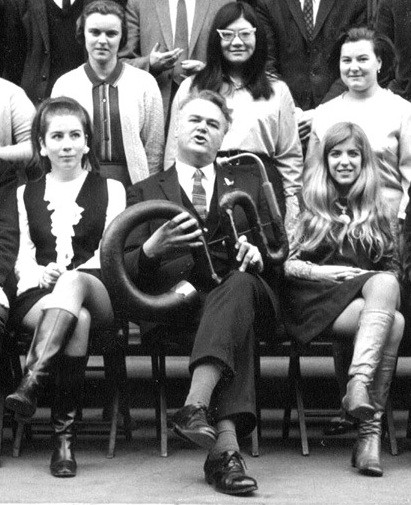manuskripte is an Austrian literary journal, first published in 1960, founded by Alfred Kolleritsch, based in Graz. More information here and here.


The French Suites were actually called by Bach Suites pour le clavecin; but this does not mean that the nature of the keyboard instrument for which they were intended can be precisely specified. Terry was of the opinion that they "are suited to the harpsichord rather than the clavichord, for they invite the tonal contrasts which only the former could afford", but a convincing case could doubtless be put forward for the clavichord, since it was Bach's favourite domestic instrument and the Suites were initially written in a home album for Bach's second wife Anna Magdalena. Anyway, Thurston Dart's performances on the clavichord, though obviously without the range of colour of Kirkpatrick's recordings, make unfailingly satisfying listening by reason of their sheer musicality, their stylishness, their varied articulation and their wealth of expressive nuance. By omitting all repeats (and even the do capo Minuet in Suite I, though not that in Suite III), Dart saves a whole side over his rival—who, of course, was able to vary his registration for each repeat; but though the music is often so fine that one wants to hear it through again (and though, of course, dance-form movements, such as these all are, should properly have each half repeated), for gramophone purposes the shorter version has its advantages.I've mentioned here before how I value a sense of intimacy in recordings of chamber music. Whether or not these pieces were intended to be played on the clavichord, this instrument produces the more intimate recording, as though it were more an approximation of Bach's own compositional process rather than the suites' first public performance.
 |
| Thurston Dart in 1964, via Semibrevity. |
"I like the idea of coming up with a society that is a little better than this—a gradualist, ameliorist spirit getting something a little fairer and a little more compassionate than most governments we’ve seen. But the idea of a Utopia has always been completely repulsive to me. [...] What would one do in a Utopia? And, certainly, what would one write about? It’s rebarbarative, the idea of everyone being happy and equal. Because it takes no account of human nature. [...] Who would want the socialist Utopia? Especially if you were at all artistic—you want all those inequalities, because that’s what makes life interesting." 1My art is more important than your equality. Capitalist naturalism and the aestheticization of poverty. A perfect new addition to the culture of Bourgeois Brooklyn!